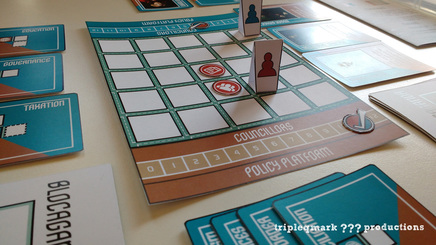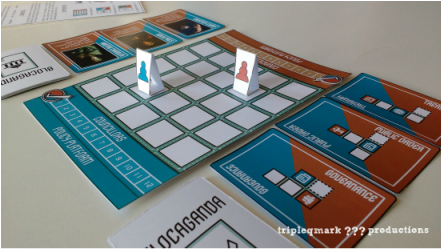I had the opportunity to playtest the newest version of Blocaganda at SwanCon and soon after at Playup Perth! The most recent playtest was the first public playtest with the councillor cards and the first time I had the opportunity to try out the four-player mode.
Councillor Cards
From my playtests at SwanCon, I learned that the combos caused people to restrict the policies they aimed for, because they wanted to optimise their decisions to gain both the backing of councillors on the policies, as well as the councillor powers. This meant that players would at most be gaining and using two to three powers per game.
Feedback on changing how the powers were incorporated, either to allow access to multiple specific powers whenever a policy was claimed or completely separating the policies and the powers available. The latter was found to be more enjoyable, as players could gain access to more powers during the game, around three to four per player per game, which meant that more turns over the course of the game presented interesting choices for the player.
It also made the game more elegant. Previously, players had to refer back and forth from the policies they had claimed, the policies available to be claimed and their combo sheet to understand what powers they had available to them or could be acquired by claiming the right policy. Now, players have access to three councillor powers at all times, doing away with the need to cross-reference, which they can select from when they claim a policy. This then reduced the length of the game to the duration before combos were added.
The main feedback from the Playup Perth playtest was the need for more councillor powers. With players going through roughly double the number of councillor powers now, compared to when combos were used, the number of powers also needs to increase to ensure replayability.
Feedback on changing how the powers were incorporated, either to allow access to multiple specific powers whenever a policy was claimed or completely separating the policies and the powers available. The latter was found to be more enjoyable, as players could gain access to more powers during the game, around three to four per player per game, which meant that more turns over the course of the game presented interesting choices for the player.
It also made the game more elegant. Previously, players had to refer back and forth from the policies they had claimed, the policies available to be claimed and their combo sheet to understand what powers they had available to them or could be acquired by claiming the right policy. Now, players have access to three councillor powers at all times, doing away with the need to cross-reference, which they can select from when they claim a policy. This then reduced the length of the game to the duration before combos were added.
The main feedback from the Playup Perth playtest was the need for more councillor powers. With players going through roughly double the number of councillor powers now, compared to when combos were used, the number of powers also needs to increase to ensure replayability.
Four Player Mode
The four player mode was something I had incorporated ages ago, but never gotten around to testing, especially with so many changes being made to the two player mechanics. From this playtest, I learned that, with the tweaks I had made to the rules, the four player mechanics were solid.
The playtest also helped me determine the duration for the game which, along with two player tests, came to roughly 15 minutes per player, making the game roughly 30 - 60 min in length.
The primary feedback from this playtest was around the accessibility of the patterns drawn on the cards, with players unsure of how to interpret them without guidance. I am planning to incorporate one of the suggested methods, but not likely before I run another public playtest.
The playtest also helped me determine the duration for the game which, along with two player tests, came to roughly 15 minutes per player, making the game roughly 30 - 60 min in length.
The primary feedback from this playtest was around the accessibility of the patterns drawn on the cards, with players unsure of how to interpret them without guidance. I am planning to incorporate one of the suggested methods, but not likely before I run another public playtest.
Playup Perth Report
You can find more on the other games that were tested at the last Playup Perth at Gamecloud.net.





